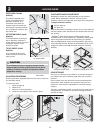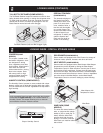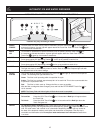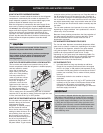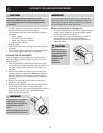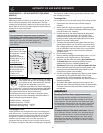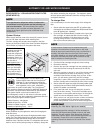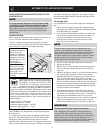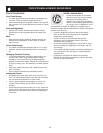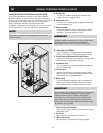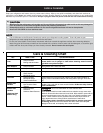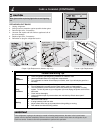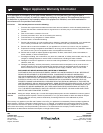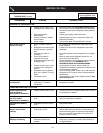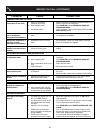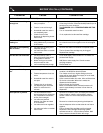
18
FOOD STORAGE & ENERGY SAVING IDEAS
FOOD STORAGE IDEAS
Fresh Food Storage
• The fresh food compartment should be kept between 34°
F and 40° F with an optimum temperature of 37° F.
• Avoid overcrowding the refrigerator shelves. This reduces
the circulation of air around the food and results in uneven
cooling.
Fruits and Vegetables
• Storage in the crisper drawers traps moisture to help
preserve the fruit and vegetable quality for longer time
periods.
Meat
• Raw meat and poultry should be wrapped securely so
leakage and contamination of other foods or surfaces
does not occur.
Frozen Food Storage
• The freezer compartment should be kept at 0° F or lower.
• A freezer operates most efficiently when it is at least 2/3
full.
Packaging Foods for Freezing
• To minimize dehydration and quality deterioration, use
aluminum foil, freezer wrap, freezer bags or airtight
containers. Force as much air out of the packages as
possible and seal them tightly. Trapped air can cause food
to dry out, change color, and develop an off-flavor (freezer
burn).
• Wrap fresh meats and poultry with suitable freezer wrap
prior to freezing.
• Do not refreeze meat that has completely thawed.
Loading the Freezer
• Avoid adding too much warm food to the freezer at one
time. This overloads the freezer, slows the rate of freezing,
and can raise the temperature of frozen foods.
• Leave a space between the packages, so cold air can
circulate freely, allowing food to freeze as quickly as
possible.
• Avoid storing hard-to-freeze foods such as ice cream and
orange juice on the freezer door shelves. These foods are
best stored in the freezer interior where the temperature
varies less.
ENERGY SAVING IDEAS
• Locate the refrigerator in the coolest
part of the room, out of direct sunlight,
and away from heating ducts or
registers. Do not place the refrigerator
next to heat-producing appliances such
as a range, oven, or dishwasher. If this
is not possible, a section of cabinetry or an added layer of
insulation between the two appliances will help the refrigerator
operate more efficiently.
• Level the refrigerator so that the doors close tightly.
• Refer to this Use & Care Manual for the suggested
temperature control settings.
• Periodic cleaning of the condenser will help the
refrigerator run more efficiently. See the
Care and
Cleaning Chart
on page 20.
• Do not overcrowd the refrigerator or block cold air vents.
Doing so causes the refrigerator to run longer and use
more energy.
• Cover foods and wipe containers dry before placing them
in the refrigerator. This cuts down on moisture build-up
inside the unit.
• Organize the refrigerator to reduce door openings.
Remove as many items as needed at one time and close
the door as soon as possible.



